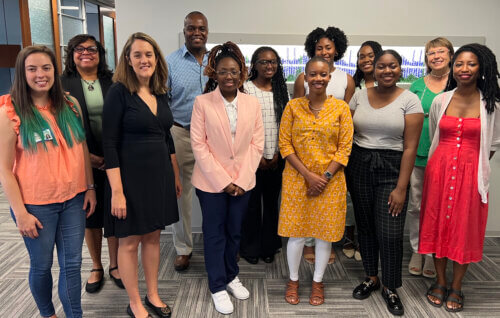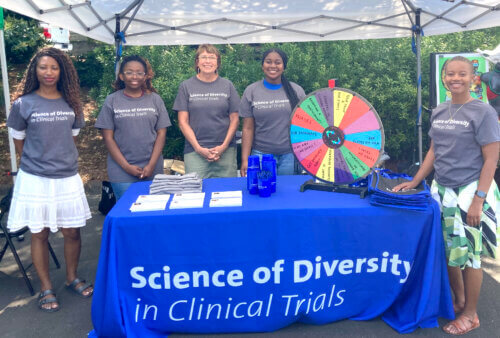The first cohort of Duke Clinical Research Institute’s newest internship program, the Science of Diversity in Clinical Trials (SDCT), celebrated the conclusion of the program by presenting the importance of community engagement in clinical research, lessons learned, and their personal journeys to the program’s faculty and staff and partners in July.
About the program
Launched in February 2023, the SDCT Internship Program is a collaboration between the DCRI and North Carolina Central University (NCCU) created to increase underrepresented groups’ interest in careers related to health sciences. Six students affiliated with NCCU participated in roundtable discussions, seminars, workshops, and clinical rounds over the course of six months.

The SDCT program is a Research Together initiative funded by Pfizer. It is led by DCRI Principal Investigator Jennifer Rymer, MD, MBA, MHS, and Project Leader Alex James. It was co-led by Tanisha Burford, PhD, and Antonio Baines, PhD, from NCCU.
An integral component of the program was the 8-week clinical placement where the interns shadowed research coordinators in hospital, clinic, and laboratory settings. They learned about the principles of clinical trial design, such as protocol management, informed consent, safety monitoring, and recruitment and retention.
“It’s a very exciting time to be involved in clinical research,” Rymer said in the program orientation. “There are so many things that we can offer patients now that we couldn’t even ten years ago.”
“Through an intensive series of professional development trainings, volunteer events, clinical research trainings and a clinical placement, the interns were exposed to patient and participant community engagement, research, health equity, diversity, patient-centric research, ethics and the importance of consent,” James said.
Lessons Learned
Each of the interns emphasized the importance of empathy and the responsibility to recognize that change takes time.
“Outside of education through events, I think it is crucial to highlight people of color working in clinical research to help educate the community,” said Nya McDougald, a senior SDCT participant who is a senior at NCCU majoring in psychology. “I felt the impact of representation during the Pfizer visit, in the hospital, and during the community event. The growth of diversity and representation can help change the narrative of clinical research.”

In addition to the importance of representation, the interns also spoke to the history of minority populations in clinical research, mistrust, enrollment barriers, prioritizing education, and community engagement.
Monica Nyang’oro, a NCCU senior majoring in behavioral social sciences, noted how collaboration is key and that she wants to be able to share what she’s learned with the community.
“My motto is take the stairs up, send the elevator down,” she said, adding that additional outreach programs for recruitment would help bridge the gap and foster casual settings where community members are willing to learn and listen.
“Diversity in clinical trials is so important,” said Baines as he congratulated the interns and thanked them for their hard work, dedication, eagerness to learn, and leadership. “You all are now advocates, whether indirectly or directly, in terms of helping people understand.”